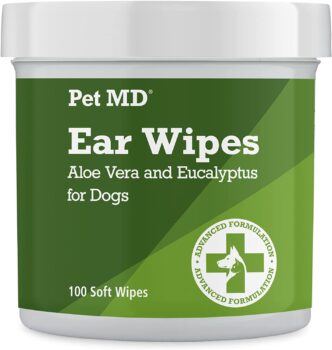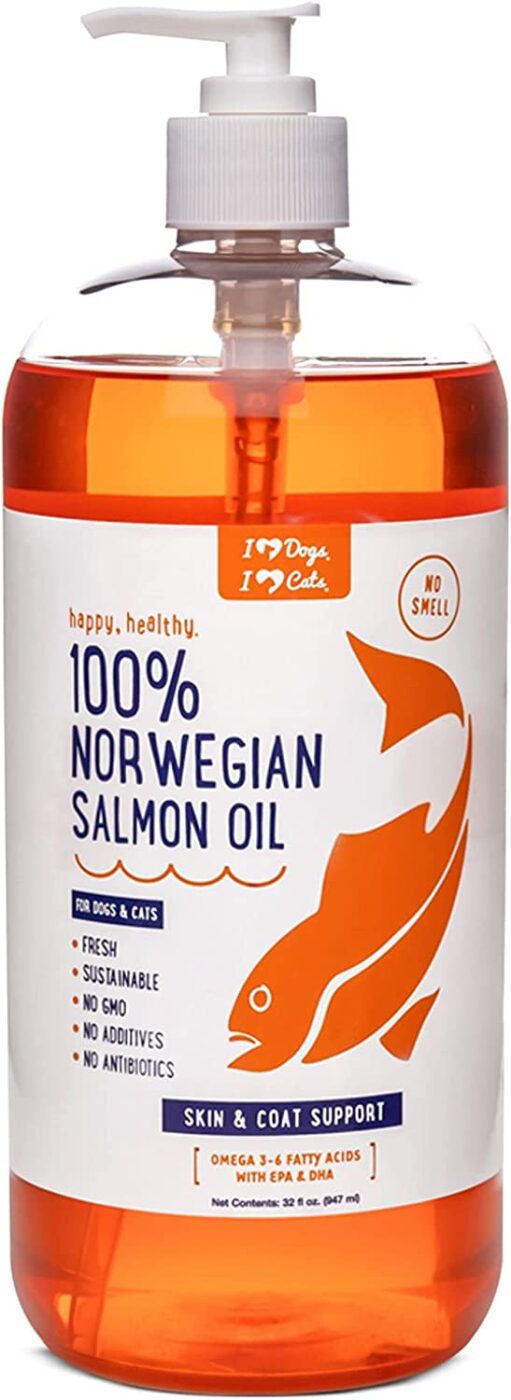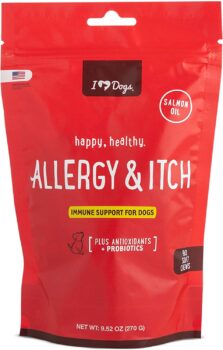
Cavalier King Charles Spaniels, often referred to as Cavaliers, are popular for their friendly and affectionate nature. While they make excellent family pets, their long, floppy ears make them susceptible to ear infections. This article offers eleven ways to treat and prevent ear infections in Cavaliers, with an emphasis on the benefits of Omega-3 in their diet for combating allergies.
iHeartDogs is reader supported. Some of the links below may be paid affiliate links, where we receive a small commission on a product at no additional cost to you.
1. Regular Ear Cleaning
The long ears of a Cavalier can trap moisture and debris, creating a suitable environment for infections. Regular cleaning with a dog-approved ear cleaner can help keep their ears healthy.
Our favorite ear cleaner is these PetMD brand ear wipes on Amazon.
2. Routine Veterinary Exams
Regular vet exams can catch the early signs of an ear infection, such as redness or unusual odors. Your vet can also provide guidance on the best ear care for your pet.
3. Swift Allergy Management
Allergies can lead to inflammation in the ear, which can cause an infection. Be vigilant for signs of allergies, such as frequent scratching or skin redness, and consult with your vet for appropriate allergy treatments.
4. Parasite Prevention
Ear mites are a common cause of ear infections in dogs. Regular use of a vet-recommended parasite preventative can help keep these tiny critters at bay.
5. Nutritious Diet
A healthy diet strengthens your dog’s immune system and can help prevent ear infections. Incorporate high-quality dog food that includes necessary nutrients and minerals.
6. Omega-3 Supplementation
Omega-3 fatty acids are known to help combat allergies in dogs by reducing inflammation. Consult with your vet about the appropriate Omega-3 supplements for your Cavalier.
We’re fans of this Norwegian salmon oil on Amazon. It’s a bright orangish-pink color and has no fishy smell at all due to it’s ultra high purity.
7. Avoiding Water in Ears
Water in the ears can create a breeding ground for bacteria and yeast. Try to keep your dog’s ears dry during bathing or swimming. If their ears do get wet, dry them thoroughly.
8. Regular Exercise
A well-exercised dog is generally a healthier dog. Regular physical activity helps maintain your Cavalier’s overall health and immune system, making them less susceptible to infections.
9. Limit Exposure to Allergens
If your Cavalier is prone to allergies, try to limit their exposure to known allergens. This might involve changing their diet, or keeping them indoors during peak allergy seasons.
A few good supplements to help your dog’s allergies are apple cider vinegar, quercetin, and colostrum, all of which are found in many natural allergy supplements like this one.
10. Appropriate Vaccinations
Certain vaccines can help prevent infections that may affect your Cavalier’s ears. Your vet can guide you on the best vaccination routine for your pet.
11. Prompt Treatment
If your Cavalier shows signs of an ear infection, such as constant head shaking or scratching at the ears, seek veterinary treatment promptly. Quick action can prevent the condition from worsening.
FAQ Section
Q1: What are the signs of an ear infection in Cavaliers? A1: Signs can include scratching at the ears, head shaking, redness or swelling of the ear canal, and an unpleasant odor.
Q2: How often should I clean my Cavalier’s ears? A2: Ideally, clean your Cavalier’s ears once a week. However, if they are prone to ear infections, you may need to clean them more frequently.
Q3: What causes ear infections in Cavaliers? A3: Ear infections can result from various factors, including allergies, bacteria, yeast, ear mites, and excessive moisture.
Q4: Can Omega-3 help treat my dog’s ear infection? A4: Omega-3 can help reduce inflammation associated with allergies, a common cause of ear infections. However, it does not directly treat an existing infection.
Q5: Can ear infections in Cavaliers be prevented? A5: While it’s not possible to prevent all ear infections, regular ear cleaning, prompt allergy management, and a balanced diet can significantly reduce the risk.
Q6: Can ear infections in Cavaliers lead to serious complications? A6: If left untreated, ear infections can lead to severe conditions such as chronic ear disease or hearing loss.
Q7: Can a change in diet help prevent ear infections? A7: Yes, a balanced diet, including Omega-3 supplements, can support overall health and bolster the immune system, reducing the risk of ear infections.
Q8: Are Cavaliers more prone to ear infections than other breeds? A8: Cavaliers can be more susceptible to certain types of ear infections due to their ear structure and potential for allergies.
Q9: How are ear infections in Cavaliers treated? A9: Treatment usually involves professional cleaning, antibiotics or antifungal medication, and in severe cases, surgery may be required.
Q10: Can home remedies cure my Cavalier’s ear infection? A10: While home remedies can assist with minor issues, any suspected ear infection should be evaluated by a vet to prevent complications and ensure proper treatment.
Cavaliers are well-loved companions, known for their affectionate nature. By understanding how to prevent and treat ear infections, we can help ensure they stay healthy and happy. Omega-3 is an important part of their diet, helping fight allergies and thus reducing the risk of ear infections. Regular vet visits are essential in maintaining their health and well-being.
The post 11 Ways to Treat & Prevent Ear Infections in Cavaliers appeared first on iHeartDogs.com.
via Whisker Therapy



